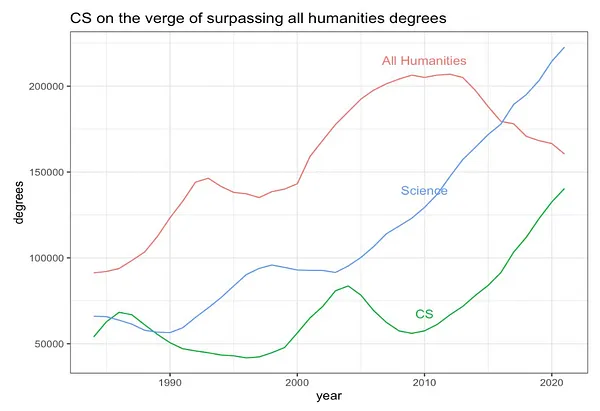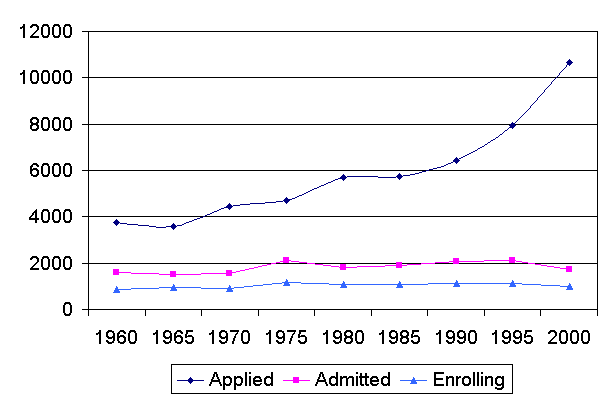I don’t why there is so much interest in ‘elite overproduction’. It’s topic that has captivated the intellectual-web over the past year especially, probably due to a convergence of societal factors like Covid and gen-z.
My own take is broken down into four parts, which I discuss in the earlier post Who are the elite, and why elite overproduction is not a problem, but will expound on here:
1. The word ‘overproduction’ suggests an imbalance or surplus of college grads, but the ever-widening college wage premium suggests otherwise. Proponents of elite overproduction theory have to reconcile the data showing college grads have much higher earnings, with the notion of oversupply, which is inherently contradictory.
2. Most college grads do not aspire to highly-visible elite roles. Some of most popular majors are psychology, nursing, business, medicine/pre-med, accounting, engineering, and ‘sports psychology’. These are actionable, good-paying careers, but not necessarily elite-track professions. If you want to be elite, you probably want to get a humanities, law, economics, or Classics degree. As I said before, elites generally deal with abstractions or words, not people or things (the only possible exceptions being business elites or political elites), which is why law school tends to be the favored path for aspiring elites. They don’t want to be doing rectal exams or having to read expense reports.
The decline in humanities’ majors is evidence against elite overproduction:

3. Elite overproduction, if it exists, is not societally destabilizing. It just means an angier, more cynical educated class, but it will not lead to unrest or the breakdown or society. Even with increased credentialization over the past 40 years, strong GDP growth, falling crime rates since the early 90s (although there was a spike in 2020-2021), record corporate profits, and record high US dollar, suggests that having a large educated class hasn’t yet had deleterious effects from a macro economic or social stability perspective.
From Noah Smith: The Elite Overproduction Hypothesis
But educated youth unrest in the late 2010s went far beyond socialism. In the 60s it was the urban poor who rioted, but surveys found that the people who flooded into the streets during the massive protests of summer 2020 were disproportionately college-educated. It’s even possible to see wokeness itself as partly an expression of frustration with the stagnant hierarchies of elite society in early 2010s America. After all, if the number of spots at university departments and companies and schools and government agencies suddenly stops growing, it means that young people’s upward mobility will be blocked by an incumbent cohort of older people who — given the greater discrimination and different demographics of earlier decades — are disproportionately White and male.
Except the majority of the BLM marches were harmless. The rioting/looting was primarily done by the least educated. Same for the women’s marches after the overturn of Roe v. Wade, which were peaceful. A handful of astroturfed gatherings to protest the latest injustice, that overnight disperses when the funders call it quits after the new President is elected, is not a threat to society. These events are all astroturfed beyond belief, which is why they end so abruptly. Same for the Jan 6th protesters who entered the Capitol; these people were overwhelmingly not well educated and most from the lower rungs of society. Even if elites can be implicated in the Kenosha and Minneapolis riots of 2020, they were so short-lived and the damage contained that the impact to the overall economy and society was minimal.
4. The ability of political elites to impart drastic change is possibly overstated. Democratic elites seem to have have mixed success at policy. ‘Defund the police’ was DOA, same for the ‘George Floyd Justice in Policing Act,’ which got zero Republican votes. AOC is regarded as one of the least effective congresspeople. It was Manchin who stole the show. A case can be made that elites were more effective generations ago, such as during the Civil Rights era, compared to today, before they became overproduced. More elites means more competition within elites, like conservative vs. liberal elites.
Save for the Supreme Court, which has resisted the trend of dilution of power seen elsewhere in federal government, aspiring elites of today probably have more competition and fewer opportunities to make a difference compared to earlier generations of elites. So this makes it harder to elites to succeed where it matters most, legislatively. Ironically, liberal elites have found more success imparting their views in the private sector, normally considered to be the domain of ‘the right’. It’s like, “If we cannot get your companies to pay higher taxes or tax your CEOs more, we’ll infiltrate your businesses and inject our values there.”
Republican elites face the same problem. Remember in 2019-2020 when Senators Josh Hawley and Ted Cruz grilled then Twitter CEO Jack Dorsey regarding Twitter censorship. Same for Zuckerberg’s 2018 House questioning over allegations of Facebook mishandling user data and privacy concerns. Neither of these went anywhere. Section 230 came nowhere even close to being overturned. Twitter faced zero repercussions for its 2020 censorship of the NY Post Hunter Biden laptop story, which was its right, but it shows how infective policy elites are at affecting the private sector. Trump similarly in 2017-2019 tried and failed to stop censorship of conservatives on major social media platforms, and in January 2021 following the Capitol protests was finally banned from Twitter.
But then again, Democratic political elites found Facebook’s response to 2016 ‘election meddling’ and privacy concerns to also be inadequate, showing how political elites on both sides have been left empty-handed. Facebook’s fact-checking capabilities have been deemed inadequate by both sides of the aisle, either for not doing enough to stop ‘hate speech’ or stopping vaccine/Covid ‘misinformation’, or for being too aggressive at censoring political dissent and for selective enforcement of the rules, like who gets banned for what (my own opinion is that Facebook should not be in the business of fact checking at all).
I will concede that there may be overproduction in the sense of unmet expectations, which is what Noah was getting at. Instead of making $200k/year or getting that NYTs editor gig, you have to settle for $80k or an internship. I think people have higher career expectations today than in the past. Maybe this means people are inclined to overestimate how common or attainable high-paying jobs are. If you hang out on ‘FIRE’ or finance subs/communities, you are only seeing a small self-selected group of high achievers, which is not representative of the general US adult population. High-paying tech jobs may seem common on certain communities or social circles, but are otherwise uncommon. Among the two biggest employers in the US are Amazon and Walmart, primarily for low-skilled jobs.
I think part of the problem is there is too much competition. For the typical 4-year institution, the median and mean quality of the student body may be worse, attributable to dumbing-down, but the competition for top-10 schools and good-paying jobs, is more fierce than ever before, so this means a lot of smart, highly-competent people are going to be left out or have to settle for fallback plans. It’s not like the number of slots for Harvard or MIT has kept up with population growth:

Also, foreign competition too, thanks to globalization. So you are not just competing against the most talented of your fellow Americans, but also overseas talent.
For the most selective of schools and jobs, things are the hardest they have ever been and this shows no sign of slowing. If the smart kids and grads of 30-70 years ago, even MIT students, where teleported to today, most would get their asses whooped by today’s smart kids. Github, math competitions, Python, LeetCode, coding and calculus at 13, etc…either those things didn’t exist 50+ year ago or were much more rare or lower stakes. Freddie deBoer is 100% right when he says that despite advances in learning and aptitude, that relative differences will always persist. It’s wrong when people say that mediocrity is bad: it’s a statistical certainty most people will be bad or mediocre if we’re looking at relative ability, even if everyone gets better in absolute ability. It’s also known as the Red Queen effect, in which going faster only means staying in place.
Affirmative action is sometimes blamed, but there are not enough blacks for this to move the needle much. Black students still only make up 9 percent of Ivy League freshmen (which is 4% below the national level and 6% for the typical college), which is less then I would have guessed. It means that talent and aptitude may still play a bigger role than preferential treatment. Same for top tech or finance jobs: despite diversity initiatives, it’s mostly whites competing against other whites for those jobs.
The D-I-Y aspect means that the cost barriers have been broken, but it also means more competition (it’s not like you could learn to code in the ’60s as easily or inexpensively like you can today). Cheap internet and personal computing may level the playing field but it also makes it a harder game, because more people are playing and the players are better.
In the ’80s and ’90s employers didn’t really have good ways of distinguishing top vs only above-average talent, like they do today. They didn’t have automated resume screening or aggressive top-10 recruiting, which made it easier to land interviews even if your qualifications were not A1.
Also, we’ve been through this before. Remember the physics crisis of the early 90s? What’s that? A sudden collapse of government funding due to the early ’90s recession and an influx of immigrants following collapse of the USSR, led to a sudden shortage of physics jobs.
Permanent research jobs for young physicists have virtually dried up, partly because the recession has drastically undercut the resources of universities and commercial research institutions. In addition, physicists in senior faculty and research positions who had been expected to retire in large numbers in recent years have not done so. At the same time, a growing tide of physicists immigrating from the former Soviet Union and eastern Europe has begun to exacerbate the glut of American physicists.
813 physicists applied for a single opening:
The situation was underscored last month when Dr. Robert Hilborn, chairman of the physics department at Amherst College, disclosed that 813 physicists had applied for a single job on the college’s physics faculty. About three-quarters were recent recipients of doctoral degrees, while some 200 were experienced physicists, including about 60 from the former Soviet Union.
There was unrest though, the Rodney King riots, which had nothing to do with unemployed physicists. Thanks to the strong ’90s economy and hype over string theory, the physics job market would eventually recover.